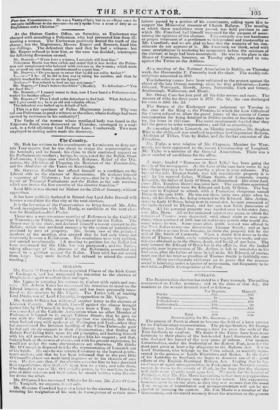A story, headed " Romance in Real Life," has been
going the roee Is of the newspapers. As the Lets of the case have come to may kn avledge they may be found worthy a place in your columns. The hero of the tale, Thomas Smith, was left considerable property it is said, by his reputed father, William Smith, of Carmoyle, county Limerick, the father of Lady O'Brien, of Dromoland. His sister Jane (note Mrs. 'Dawkins Brew) was joint heir. The guardians appointed over the two children were Sir Edward and Lady O'Brien. The boy was sent to England to school, with a Protestant clergyman named Price, in the year 1810. He was not there quite two years when he died ; all bis clothes, &c. being returned to Sir Edward. Mrs. Arthur, sister to Lady O'Brien. being next in remainder, became possessed of the lands devised to Thomas; and her SOH now holds possession of them. All his personal property was handed over to his sister Jane, now Mrs. Brew. All so far remained quietus the grave, in which the remains of Thomas were depo4ted, until about eight or nine years since, when a reward of loot. was offered to nue person who would dis- cover where he was. Some years after, :260U/. reward was offered in the West Indies tunny one discovering Thomas South; and at last home walks a person from Jamaica, to claim the property left by the will of Mr. Smith of Carmoyle. When a doubt first arose as to the death of Thomas Smith, every satisfactory inquiry was made, and eel.- tiiicates obtained as to the illness, death, and burial of our hero. The only interest Sir Edward O'Brien has in the affair is, that the landed property, now in possession of Mr. Arthur, is left in remainder to his two sons, after the failure of issue in tail male. Sir Edward, of course, must Fee that his trust as guardian of Thomas Smith is faithfully exe- cuted. Many coarobotatory evidences go to prove that the rueueeau arrive is labouring under a species of monomania, not frequently to be met with.—Dublin Correspondent of Post.


























 Previous page
Previous page